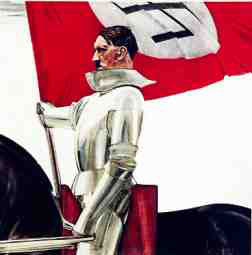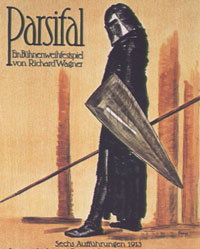Hitler was the Prince that Wagner Hoped For
The 19th Century German composer Richard Wagner was a titan of classical music, and  his epic operas exerted a strong influence on the genre. However, there was another side to the Wagner legacy -- the composer's virulent anti-Semitism. Wagner's music and anti-Semitic writings found a disciple in Adolf Hitler, who would plunge Europe into the darkest period of its history by launching World War Two and presiding over the genocide of millions of Jews and others who did not conform to the Fuehrer's racist Aryan ideal. In one of his essays, Wagner called for German princes to support a national art, particularly theater, imbued with the "German spirit" and in union with the Volk. In a sense, Hitler was the "prince" that Wagner hoped for: the Nazi leader implemented anti-Semitic and volkisch policies in line with the composer's ideas.
his epic operas exerted a strong influence on the genre. However, there was another side to the Wagner legacy -- the composer's virulent anti-Semitism. Wagner's music and anti-Semitic writings found a disciple in Adolf Hitler, who would plunge Europe into the darkest period of its history by launching World War Two and presiding over the genocide of millions of Jews and others who did not conform to the Fuehrer's racist Aryan ideal. In one of his essays, Wagner called for German princes to support a national art, particularly theater, imbued with the "German spirit" and in union with the Volk. In a sense, Hitler was the "prince" that Wagner hoped for: the Nazi leader implemented anti-Semitic and volkisch policies in line with the composer's ideas.
Wagner expressed his anti-Semitism in his infamous essay, "The Jews in Music" -- first published under the pseudonym "K. Freigedank" (K. Free-thought) and later published in  Leipzig in 1869 under the composer's signature. In explaining why he wrote the essay, Wagner presaged Hitler's view that the Jews control newspapers and other media: the composer said the Jews were the cause of Press hostility towards him in Germany, England, and France. Wagner also bequeathed to Hitler the belief that Jews were controlling society. Wagner explained that his essay threw "a needful light on this yoke of the ruling Jew-society in its crushing-out of all free movement, of all true human evolution, among its kith and kin." In the essay, Wagner expressed the familiar view of Jewish control of finance: the Jew "rules, and will rule, so long as Money remains the power before which all our doings and our dealings lose their force."
Leipzig in 1869 under the composer's signature. In explaining why he wrote the essay, Wagner presaged Hitler's view that the Jews control newspapers and other media: the composer said the Jews were the cause of Press hostility towards him in Germany, England, and France. Wagner also bequeathed to Hitler the belief that Jews were controlling society. Wagner explained that his essay threw "a needful light on this yoke of the ruling Jew-society in its crushing-out of all free movement, of all true human evolution, among its kith and kin." In the essay, Wagner expressed the familiar view of Jewish control of finance: the Jew "rules, and will rule, so long as Money remains the power before which all our doings and our dealings lose their force."
Wagner's writing could be viewed as the unenlightened ranting of a hateful crank -- except for his leading position in music and his influence on Hitler. Wagner's essay was an attack on what he saw as Jewish control of music and was a critical assault on two of his rivals, Felix Mendelssohn and Giacomo Meyerbeer -- both of Jewish descent. Like Hitler, Wagner used crude epithets to describe Jews -- "repellent," "unpleasant freak of nature," "disagreeably foreign," and "the evil conscience of our modern society." Wagner also anticipated Hitler's view of the Jews as culture destroyers, not creators. The composer believed that Jews insidiously had taken control of music even though the Jew, in his view, was only capable of mimicry and was "innately incapable of enouncing himself to us artisitcally through either his outward appearance or his speech, and least of all through his signing." Wagner described Jewish voice-sounds as "a creaking, squeaking, buzzing snuffle" and "an intolerably jumbled blabber." Wagner believed that because the Jew was an alience, in his view, he could not express in art the "genuine spirit" of the Volk --- the wellspring of inspiration. Wagner's writing could be viewed as the unenlightened ranting of a hateful crank -- except for his leading positiion in music and his influence on Hitler.
